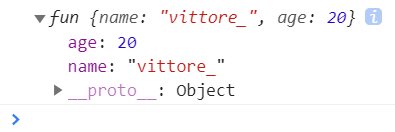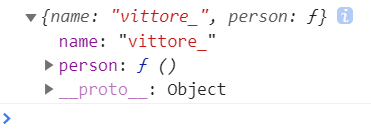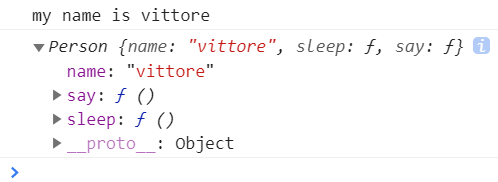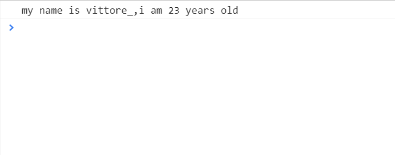对于一个前端初学者来说,this 的指向是一个必须要掌握的知识点,尤其是 ES6 之后的 this 指向更加变得飘忽不定,我们今天就来了解一下在 browser 中各种情况下 this 的指向。
# 什么是 this
首先,this 不是一个函数也不是某个对象,它具体指向什么东西取决于我们在哪里去调用这个 this,只有函数调用的时候才会发生 this 的绑定,主要有有以下几种情况
- 全局作用域
- 函数作用域
- 作为对象方法和对象的属性值
- 构造函数中
- 箭头函数中
- class 类中
# 1. 全局作用域
console.log(this === window) //true |
当我们在全局作用域中调用的时候,this 指向的是 window 对象,相当于 window 调用的这个 tihs

# 2. 函数作用域
function test(){ | |
console.log(this) //this指向window | |
} | |
test() |
此时会发现在函数体内 this 也是指向的 window,究其缘由是因为在全局调用的 test 函数,当我们调用的时候会进行默认绑定,也就是绑定到 window 上

# 3. 作为对象方法和对象的属性值
var Person = { | |
name: 'vittore', | |
that: this, | |
age: function () { | |
console.log(this) //Person对象 | |
console.log(this.name) //vittore | |
}, | |
} | |
console.log(Person.that) //window 类似纯函数调用 | |
Person.age() //调用对象的age方法 |
此时会看到,当我们把 this 作为对象的某个方法去调用的时候,this 指向的是这个对象,相当于这个对象调用这个方法

var Person = { | |
obj: { | |
name: 'vittore_', | |
sex: function () { | |
console.log(this) //obj对象 | |
console.log(this.name); //vittore_ | |
}, | |
}, | |
} | |
Person.obj.sex() //调用penson对象中的obj对象的sex方法 |
另外,在嵌套对象中,this 指向同样是谁调用则指向谁,这时候是 obj 对象调用的。

# 4. 构造函数中
var name = 'vittore' | |
function fun(name, age) { | |
this.name = name | |
this.age = age | |
} | |
var obj = new fun('vittore_', 20) | |
console.log(obj) //控制台打印如下 |

此时,this 指向的是构造函数所创建出来的实例、即 obj 对象
# 5. 箭头函数中
var obj = { | |
name:'vittore', | |
say:()=>{ | |
console.log(this) | |
} | |
} | |
obj.say()//控制台打印出了window |

箭头函数没有自己的 this, 会默认继承父级执行上下文的 this,这里的上下文 this 就是 window
# 5.1 函数执行时会创建一个称为执行上下文的内部对象 (可理解为作用域)
注:一个执行上下文定义了一个函数执行时的环境,而对象是没有执行上下文的。
var obj = { | |
name: 'vittore_', | |
// person: function () { | |
// return { | |
// name: 'vittore', | |
// say: () => { | |
// console.log(this) | |
// }, | |
// } | |
// }, | |
person: () => { | |
return { | |
name: 'vittore', | |
say: () => { | |
console.log(this) | |
}, | |
} | |
}, | |
} | |
obj.person().say() | |
//调用say方法这里的this指向的是obj对象,因为箭头函数没有this会向上查找,此时上级则是一个普通函数,而普通函数创建时会绑定this,如果person函数也是箭头函数的话this则指向window |

# 6.class 类中
class Person { | |
constructor(name) { | |
this.name = name | |
this.say = function () { | |
console.log('my name is ' + this.name) | |
} | |
} | |
sleep = function () { | |
console.log(this) | |
} | |
} | |
var obj = new Person('vittore') | |
obj.say() //调用obj对象的say方法 控制台打印 ‘my name is vittore’ | |
obj.sleep() //调用obj对象的sleep方法 打印 obj对象 |

可以看到在 class 中的 this 都是指向这个构造函数生成的对象
# 更改 this 指向(面试的常问点)
可以通过如下方式进行更改
- bind
- call
- apply
var Person = { | |
name: 'vittore', | |
say: function (age) { | |
console.log(`my name is ${this.name},i am ${age} years old`) | |
}, | |
} | |
var obj = { | |
name: 'vittore_', | |
} |
直接调用
Person.say ()

通过 bind ()
- Person.say.bind (obj,'22',' 第二个参数 ',...)()
![bind()方法更改this指向-第一种传参 Philadelphia's Magic Gardens. This place was so cool!]()
- Person.say.bind (obj)('22',' 第二个参数 ',...)
![bind()方法更改this指向-第二种传参 Philadelphia's Magic Gardens. This place was so cool!]()
注:bind 返回的是一个重新绑定 this 的函数,因此需要调用,两种传参方式,参数依次加在后面
通过 call ()
- Person.say.call (obj,'23',' 第二个参数 ') //call 返回的是重新绑定 this 并且立即调用之后的结果,参数依次加在后面
![call()方法更改this指向 Philadelphia's Magic Gardens. This place was so cool!]()
通过 apply ()
- Person.say.apply (obj,['24',' 第二个参数 ']) // 返回的同样是绑定了 this 并且立即调用之后的结果,参数是数组格式
![apply()方法更改this指向 Philadelphia's Magic Gardens. This place was so cool!]()



